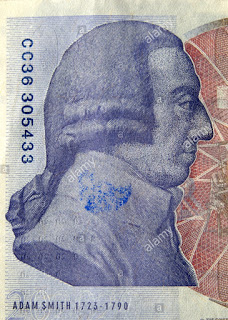Summary:
I discussed in a previous post the reasons why the Bank of England is considered a central bank, but not its precursors. I did not pay enough attention in that post to the reasons for which the early public banks were created. Adam Smith discussed that in his magnum opus. From the Wealth of Nations: “The currency of a great state, such as France or England, generally consists almost entirely of its own coin. Should this currency, therefore, be at any time worn, clipt, or otherwise degraded below its standard value, the state by a reformation of its coin can effectually re-establish its currency. But the currency of a small state, such as Genoa or Hamburg, can seldom consist altogether in its own coin, but must be made up, in a great measure, of the coins of all the neighbouring states with which its inhabitants have a continual intercourse.
Topics:
Matias Vernengo considers the following as important: Adam Smith, History of central banks
This could be interesting, too:
I discussed in a previous post the reasons why the Bank of England is considered a central bank, but not its precursors. I did not pay enough attention in that post to the reasons for which the early public banks were created. Adam Smith discussed that in his magnum opus. From the Wealth of Nations: “The currency of a great state, such as France or England, generally consists almost entirely of its own coin. Should this currency, therefore, be at any time worn, clipt, or otherwise degraded below its standard value, the state by a reformation of its coin can effectually re-establish its currency. But the currency of a small state, such as Genoa or Hamburg, can seldom consist altogether in its own coin, but must be made up, in a great measure, of the coins of all the neighbouring states with which its inhabitants have a continual intercourse.
Topics:
Matias Vernengo considers the following as important: Adam Smith, History of central banks
This could be interesting, too:
Angry Bear writes “The Many Faces of Adam Smith”
Matias Vernengo writes What’s the deal with The Smiths
Matias Vernengo writes Classical Political Economy or the Surplus Approach
Matias Vernengo writes The worldly philosophers go to Washington: Episode 3, Farmer and Merchants
I discussed in a previous post the reasons why the Bank of England is considered a central bank, but not its precursors. I did not pay enough attention in that post to the reasons for which the early public banks were created. Adam Smith discussed that in his magnum opus. From the Wealth of Nations:
“The currency of a great state, such as France or England, generally consists almost entirely of its own coin. Should this currency, therefore, be at any time worn, clipt, or otherwise degraded below its standard value, the state by a reformation of its coin can effectually re-establish its currency. But the currency of a small state, such as Genoa or Hamburg, can seldom consist altogether in its own coin, but must be made up, in a great measure, of the coins of all the neighbouring states with which its inhabitants have a continual intercourse. Such a state, therefore, by reforming its coin, will not always be able to reform its currency… In order to remedy the inconvenience to which this disadvantageous exchange must have subjected their merchants, such small states, when they began to attend to the interest of trade, have frequently enacted, that foreign bills of exchange of a certain value should be paid not in common currency, but by an order upon, or by a transfer in the books of a certain bank, established upon the credit, and under the protection of the state; this bank being always obliged to pay, in good and true money, exactly according to the standard of the state. The banks of Venice, Genoa, Amsterdam, Hamburg, and Nuremberg, seem to have been all originally established with this view, though some of them may have afterwards been made subservient to other purposes.” (WN, Book IV, chapter III)
The creation of a stable unit of account, which was essential for international trade, seems to be central for their creation. Proof of the importance of foreign exchange for this small, trade oriented, states is that this banks had a monopoly on foreign exchange clearing. In a sense, to guarantee the unit of account, and, as a result trade, was essential for government revenue which was to a great extent tied to the fortunes of foreign trade. In some sense, this preoccupation with a stable of unit of account is not unrelated to the function as a fiscal agent of the state.

